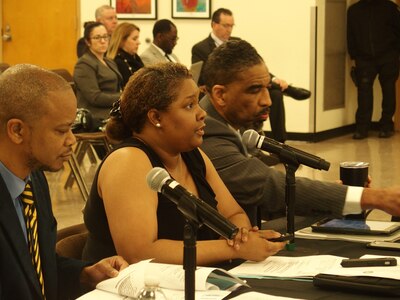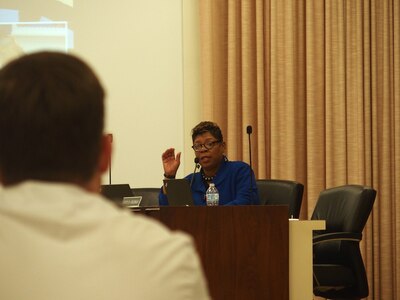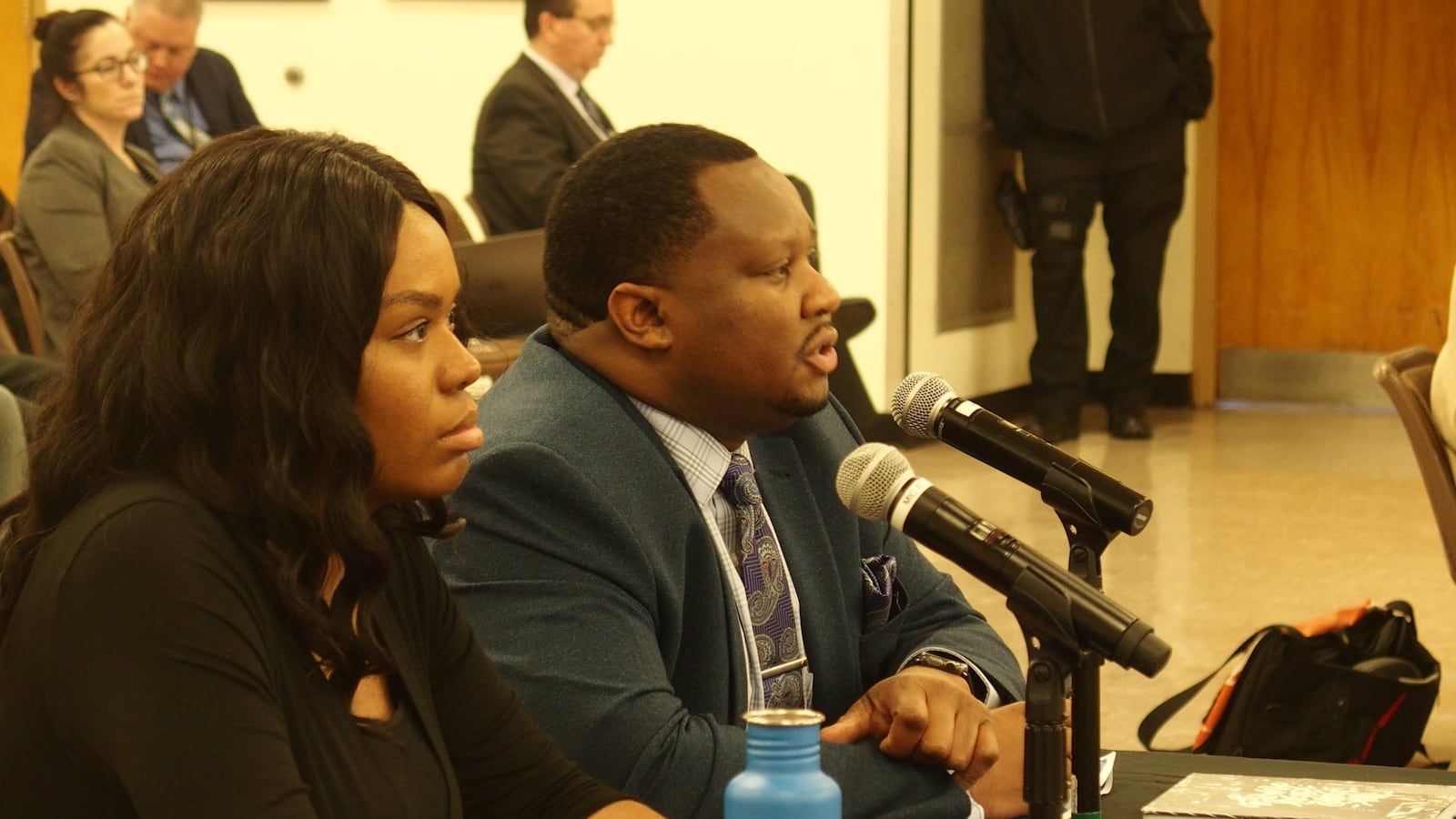Charter school leaders whose schools are in danger of closing in May said Thursday that school board members should look at more than test scores when considering a school’s impact on a community.
Operators said they helped parents find jobs, invested millions in commercial development including medical resources near schools, and are even working to build houses to support school families.
Shelby County Schools board members heard arguments from district staff and from Memphis Business Academy Middle, Memphis College Preparatory Elementary, and Veritas College Preparatory ahead of a Jan. 28 vote to renew their 10-year contracts.
If school board members accept district staff recommendations, more than 900 students may need to find new schools in the fall. The hearings were the board’s opportunity to hear from charter schools leaders why they should remain open. Charter schools have driven much of the district’s growth in student enrollment and district leaders have lamented the loss of funding associated with those students leaving district-run schools.
During their hearings, charter leaders took issue with some of the district’s annual scorecard calculations — the basis for charter school recommendations — and steered board members to more favorable state numbers.
Requirements for student learning in Tennessee have drastically changed in the last 10 years and so have the tests to assess their knowledge. District staff said testing data from 2018 was excluded from a school’s score if it was harmful, in line with the state law passed after significant technical failures of the state’s annual test.
But Shelby County Schools staff said even outside of those complaints, none of the schools have met academic goals laid out in their contracts.
“Our office is making our recommendation based on quantitative data,” said Brad Leon, the district’s chief of strategy and performance management. He said he “wouldn’t give any weight” to community impact outside of academics. The school board makes the final decision.
Below is a summary of each of the one-hour hearings:
Memphis Business Academy Middle, 506 students
Memphis Business Academy Middle in the Frayser neighborhood of Memphis has been open for 15 years and was renewed once when the state required 5-year operating agreements.
Leon said the school has only “marginally improved in the last 10 years” and “at no time in their charter has Memphis Business Academy met their own goals” to surpass the district’s academic performance.
“We support choice, but it must be exceptional,” he said.

Memphis Business Academy leaders said if the district had used the same method as the state to calculate out-of-school suspension rates, the school’s scores would have been within the acceptable range for the district to renew its contract. The state measures out-of-school suspensions by the number of students suspended, but the district counts the number of suspensions. If a student is suspended more than once, the school’s number will be larger than the state’s calculation for suspensions.
The network is set to spend $11 million to redevelop a Frayser shopping center and even more on a new school and nearby medical center.
“Nowhere on that scorecard did it take into account the qualitative areas that make us who we are in Frayser,” said Anthony Anderson, the network’s CEO. “As a network, we continue to invest in the total community.”
In anticipation of the vote, network leaders distributed advertisements containing parent and alumni testimonials, urging community members to email school board members in favor of keeping the school open.
Board member Stephanie Love, whose district includes the middle school, said she was concerned with the school’s academic data, but also praised the network’s work in the community.
Memphis College Preparatory, 279 students
Memphis College Preparatory is an elementary school in South Memphis. Leaders there bought and moved into a closed school building from Shelby County Schools and are working with the Tennessee Housing Development Agency to build homes for some of its families, said Tyree Daniels, the school’s board chair. School leaders also help parents find jobs and homes when they are in crisis, he said.
The principal, Trakela Small, grew up in the neighborhood and said despite low test scores, the school has made “radical” changes to perform better in the future. Daniels said the school performs better than district-run and charter elementary schools in the immediate area and deserves the chance to stay open.
He also defended the school’s discipline practices, which garnered the lowest score on the district’s report card.
“I would rather create a safe learning environment for scholars and teachers any day rather than be worried about the cumulative effect it was going to have on my scorecard,” he told board members.
Leon, the district’s representative, said the school has seen encouraging academic growth and had few students who were absent from school for more than 10% of the school year. However, the school has not outperformed the district averages in any subject in recent years.
Veritas College Preparatory, 157 students
Veritas College Preparatory missed receiving the district’s recommendation for renewal by just two hundredths of a point. So, the South Memphis middle school leaders recalculated their scores by taking the average of all 10 years during its charter agreement, using the district’s numbers. The result was a score that surpassed the district’s threshold for continuing to operate.

The district, however, separated scores into three groups rather than average them all together. That’s because of the numerous changes in testing in Tennessee over the past 10 years, and district staff wanted to compare test scores from similar phases in state testing.
“My hope is you can look at the entire record,” said Nick Getschman, the school’s executive director. “I just don‘t think that two hundredths of a point represents what we’ve been doing for kids and what we can continue to do for students.”
Getschman also pointed to the district’s report card scores for other middle schools in the neighborhood and Veritas came out on top.
“I want to make sure that if they are going somewhere else next year that my students are getting something as good or better,” he said.
Leon said because less than a third of students attending the school live in the neighborhood, it was a misleading comparison. He also pointed to test data that showed scores are worse now than they were when the charter school opened.
“Across every metric, Veritas has cause for concern and in every metric except math students are performing at a worse level than they were a decade ago,” Leon said. “Veritas’ scores are going in a decidedly wrong direction.”
Rejected charter schools can appeal to the state Board of Education within 10 days of the local board’s decision.

